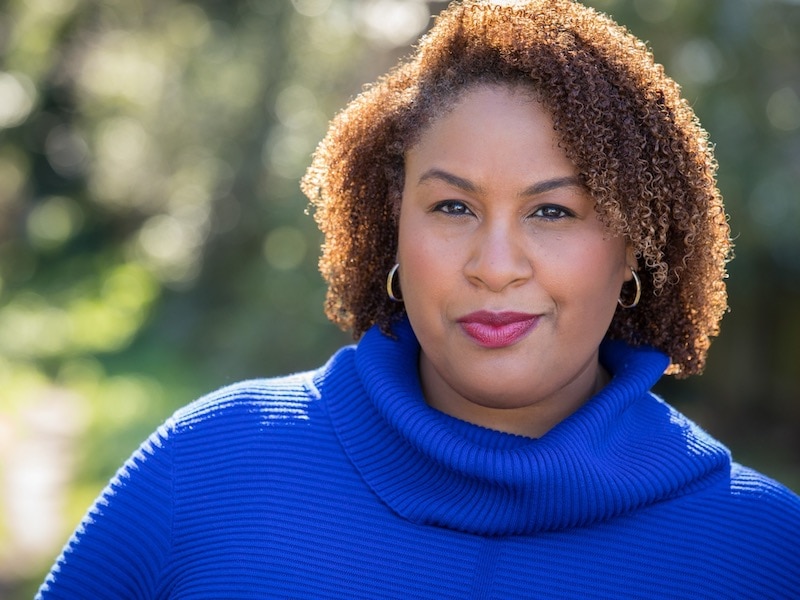When Arena Stage raised its first curtain in 1950, Harry S. Truman was finishing the first year of his second term as President of the United States. Since then, the U.S. has had 13 chief executives. Arena Stage, four. This remarkable fact has provided Arena Stage a lasting role in an ephemeral art form. The theater’s founding artistic director, Zelda Fichandler, served over 40 years. Douglas C. Wager led the company from 1991 to 1998 before passing the torch to Molly Smith, who kept it burning brightly for the next 25 years.
On August 21, 2023 (nearly 73 years to the day after Arena opened), Hana S. Sharif became the theater’s artistic leader. A playwright, director, and producer, Sharif, 45, shares in an in-depth interview her plans to serve and evolve the venerable company. (This interview has been edited for length and clarity.)

DCTA: You’re more than halfway through your first 100 days in office, that time-honored DC yardstick. How have they been?
Hana S. Sharif: They’ve been intense and crazy and a roller coaster and I’m having so much fun [laughs]. Especially coming out of the last few years, there’s something really refreshing about being in a new space with new energy, in a place that has so much capacity for the future. That’s been keeping me floating through the very long days.
A nice change of atmosphere from the height of the pandemic.
I was in New York recently with what I call my “class” of artistic directors, those of us who came into executive artistic leadership in the last six years, for a think-tank conversation. People were asking me about how it’s going, and I felt a little bad because I’ve never been happier to just have normal theater problems, not an existential crisis. I’m appreciating this moment of “I know exactly how to do this.”
How was your first Opening Night at Arena, for Selina Fillinger’s farcical POTUS: Or, Behind Every Great Dumbass Are Seven Women Trying to Keep Him Alive?
POTUS is playing in a lot of cities, but there’s something different in telling this story in DC. It’s important that we allow people a space to laugh at things that border on the ridiculous but are also true. Every week something happens in the world that relates to a line in the play. I shared on opening, “We can’t be here and not acknowledge that it feels like our world is on fire right now, but there’s no place I’d rather be than in the theater with this group of people, from many different backgrounds, being reminded of our fundamental humanity.” When the world gets scary, I tuck myself into the work, because that’s the way to connection, to healing, to peace. Like Toni Morrison said, “This is precisely the time when artists go to work.”
How have you been getting to that important work with the staff and artists at Arena?
I’ve spent time every week getting to know the departments at Arena one by one. “What do you do? How can I make your life easier? What do you believe is essential about Arena Stage? What plays do you want to see on stage? Where are we doing our best work?” People have been so willing to share. They have been thinking about the evolution of our field and are able to contextualize it within the framework and possibilities of this theater.
It’s very hard to overstate how important these conversations are to me. They’re the conversations I wish I had in other transitions, solidifying a foundation of understanding and buy-in, learning about what motivates us, and dreaming forward together. And the board of directors have taken it upon themselves to introduce me to lots of people. It’s pretty special.
Speaking of transitions, how have you been approaching succeeding a leader of Molly Smith’s tenure and legacy?
There has to be a recognition that you are coming into a house that has been built by a singular, formidable leader. You also have to have clarity about where the organization is in its evolution and what your job is in that evolution. When I joined St. Louis Rep, it was clear I was there to be a change agent, to move the organization more fully into the 21st century. I’m naturally inclined to embrace and be energized by evolutionary change.
Molly has been incredibly generous to me. She knows her legacy is in the DNA of this organization, and a leader like that isn’t worried about someone coming in and erasing them. They cannot be erased. I remember as I was transitioning, she said, “Hana, people keep telling me how you’ve got big shoes to fill. I tell them I’m taking my shoes with me. They hired you to do what you do, what no one else can do.” That level of generosity was unprecedented for me. It made it easier to come in and not try to tiptoe, to feel I had been given permission to step into the space as my full self as a leader. That’s the best way to work, but it isn’t always a given.
And before Molly, Arena was led by the legendary Zelda Fichandler.
Todd London, who’s a great writer and thought leader, just released an article about the state of the industry. He quotes Zelda Fichandler quite a bit (he’s also edited a collection of her writings). 25 years after she built Arena, she was challenging the financial system it was built upon, saying it’s fractured and will destroy the regional theater movement. She’s pretty spectacular as a visionary. If we go back to our origin documents, we find revolutionary roots. Revolutionary in that the art is at the center instead of the institution being in the center. Everything in the institution should work for the good of the art, which works for the good of the people. What a lineage to come from. I always say I’m thinking five, ten, 15, and 50 years into the future with every decision. I’m stewarding this moment to help the institution evolve and meet an evolving society, the evolving needs of our community, and serve this mission to reflect the full spectrum of the American spirit.
Alongside Edgar Dobie, the executive producer and president of the corporation.
Edgar is an amazing leader and partner. He’s played many different roles in the American theater, and stepped into Arena at a critical time, the middle of the building’s reconstruction [in 2009], and wrangled the finances. He’s a big part of why Arena has more resilience than many other theaters in this moment. At every step of the journey, he has reimagined and reconceived how to support the art at the center. To have the legacy and history he has, along with the instinct and curiosity to continually reimagine, is a very powerful combination. It’s his superpower.
You’ve also played many different roles but always at nonprofit, regional theaters outside of New York.
I have very intentionally chosen a life in regional theater because I believe in the transformational power of art. In New York, commercial theater is king. Broadway is king. What most people don’t fully appreciate, I think, is how many commercial projects come out of regional theaters. The most important voices in the American theater are being cultivated all across the country by theaters that have the capacity and the muscle to build commissioning and developmental spaces for them.
Also, commercial theater is all about single-ticket sales. You go to New York for a week, you’re going to go see Hamilton. That’s a different audience than the one that comes to six or seven shows, or even three shows, a season. You’re able to curate a discourse over the course of a year. You’re able to see the collision of art and community, how art is motivating, is changing, is creating new forms of dialogue and bridges. You see the actual transformative effect of art. I also get to build partnerships and collaborations with organizations across the city that can lift the impact of those things. It doesn’t happen the same way in New York.
How will Arena address the changes, often decreases, in subscribers and audiences in general?
Regional theater has been really good at talking to one audience, as if we didn’t realize we were, one, meant to serve generations, and, two, supposed to invest in future generations. To me, that is not necessarily a shift in the work. Great work resonates across spectrums. It’s a shift in the way you talk about the work. It’s a shift in the way I invite you into the process. What makes my mom feel this is her home is going to be different than what makes me feel this is my home. It isn’t the home that’s different. It’s the invitation to an experience that will be relevant to your life. We haven’t figured out the muscles for speaking to the next two generations. And when I say that, people often think of people in their 20s. When I say the next two generations, I mean Gen X and Millennials, people who are 30 to 55. We’ve got to invest in those audiences. If I speak a language you understand, and what I’m offering is great art, then when you come in and have a pivotal experience it creates a connection between us.
We’re a public good. I can sell theater anywhere because I still believe it, and I’m willing to back every commitment I make. If I come into a community and say, “We’re here to serve you,” then it’s not with one show. We’re going to dig into the ground with you. Arena has such amazing capacity to do that work. I don’t have to do a rebuild here. I get to dream forward with a solid foundation that is 73 years old.
DC has seen many artistic leadership changes at theaters large and small in the last few years. What excites you most about joining this community?
There are so many leaders that I grew up with leading theaters in this city. I’m so excited to be in community, in conversation, and in possible collaboration with them. We’re hitting a really exciting time for theater in this region. DC is well positioned to pull out across the rest of the field as the most important city for theater. The ecosystem is strong. There’s such a wide spectrum of work being done here. I think it’s a matter of time.
SEE ALSO: Arena Stage names Hana Sharif as its new artistic director (news story, April 26, 2023)





